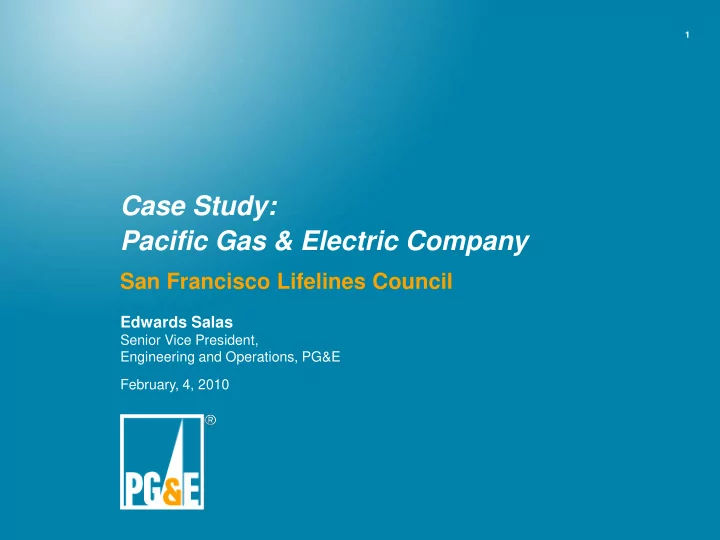

1 Case Study: Pacific Gas & Electric Company San Francisco Lifelines Council Edwards Salas Senior Vice President, Engineering and Operations, PG&E February, 4, 2010
2 Today’s Presentation from PG&E Coordinate with the Lifelines Council to: • Lifelines Partnership Opportunities • Design System Standards • Emergency Planning and Response Activities
3 PG&E’s Coordination Goals with the Lifelines Council Coordinate with the Lifelines Council to: • Establish response and recovery priorities • Facilitate Mutual Logistics Support • Enhance Effective Communication Formal acknowledgement that PG&E is a first responder organization Identify restoration priorities regarding non-PG&E facilities for immediate electric/gas service
4 System Map and Customers Served PG&E Facts Regarding Customers Served in California • 70,000 Square Miles • 15 Million People Served • 4.2 Million Gas Customers • 5.1 Million Electric Customers • 3,400 Buildings
5 Earthquake Risk Management Program
6 6 “Each utility shall withstand earthquakes to provide protection of life, limit damage to property, and provide for resumption of utility service in a reasonable and timely manner.” California Seismic Safety Commission/CPUC Safety Branch
7 Federal and State Standards • Federal Energy Regulatory Commission (FERC) • Nuclear Regulator Commission (NRC) • CPUC General Orders
8 Design Standards (Examples) • Department of Transportation (DOT) • 2007 California Building Code • Existing Building Retrofit Standards and Compliance
9 Seismic Risk Management Approach • Evaluate Facilities and Operations • Prioritize Selected Facilities for Mitigation • Implement Mitigation • Minimize Level of Earthquake Risk
10 245 Market Street
Moss Landing 500kV Switchyard 11 Damage to Live Tank Circuit Breakers 1989 Loma Prieta Earthquake
12 Improving PG&E’s System Performance Seismic Tests on Replacement Breakers Gas Pipeline Replacement Program (GPRP)
13 PG&E Seismic Investments (1985 to Present) Facilities • Buildings • Electric Substations • Dams and Related Hydro Facilities • Power Plants • Gas T&D • Loma Prieta Repairs TOTAL BUDGET $2.54 Billion (estimate)
14 Improving PG&E’s System Performance Vacaville Grid Control Center Iso-Base
15 Post-Earthquake Emergency Response and Restoration Management and Coordination
16 Post-Earthquake Response Scenarios “Expected” and “Extreme” Earthquakes
17 Post-Earthquake Assessment • Strong Motion Instrument Program • Post-Earthquake Building Inspection • Gas and Electric Emergency Response Programs • GIS • USGS Shake Maps • Dam Information Automated Seismic Hazard Assessment
18 PG&E’s Emergency Planning and Response Activities • Primary and Alternate Emergency Operations Centers • ICS/NIMS Incident Management • Formalized Business Continuity Program – alternate headquarters, “tech down” plans, disaster recovery and resource recovery plans • Integrated Training and Exercises with Federal, State, and Regional Agencies Including CCSF SFFD and Department of Emergency Management (DEM) • California Utility Emergency Association (CUEA)
19 Emergency Operations Center (EOC)
20 Lifelines Comparison—Dependencies What are PG&E’s Dependencies? • Communications • Transportation • Public Safety • Emergency Medical Services Who’s Dependent on PG&E? • All other utilities • All 18 Emergency Support Functions (includes most city and county services) • Businesses • Residences
21 Service Area Overview • PG&E's gas and electric network is interconnected throughout our service area. • Restoration of lifelines in the San Francisco Bay Area will be impacted by the condition and capacity of the larger network after a major event.
22 So What Can Residents Expect? • Minimum of 72 hours electric service interruption in red and orange areas of the Shake maps. • Longer electric service restoration times where underground utilities are subject to liquefaction. • Potentially weeks and months of gas service interruption in red and orange areas of the shake maps.
23 Questions and Answers
24 Thank You
Recommend
More recommend